HISTORY
HOW DID WE GET HERE?
The history of H2 as a medical gas

1520
Hydrogen Discovered
Hydrogen was accidentally discovered by Philippus Aureolus Paracelsus. He was doing an experiment involving acid and metal and observed a mysterious flammable gas as a byproduct.
1766
flammable air
Henry Cavendish, a British philosopher, and scientist, officially distinguished hydrogen as a flammable air that forms water upon combustion.


1783
water forming
Antoine Lavoisier, often referred to as the modern father of chemistry, first used the word “hydrogene” to describe the gas. The word derives from the greek word for “hydro” meaning water, and “gene” meaning forming of creating. Essentially, hydrogen means “water-forming”.
1798
in the news
First publication mentioning hydrogen gas having medical properties.

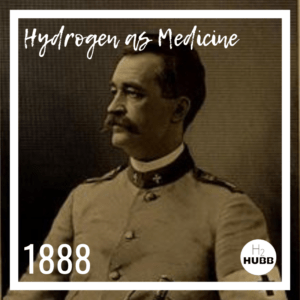
1888
hydrogen as medicine
1943
diving deep
Swedish engineer, Arne Zetterstrom, used hydrogen gas for the first time for deep sea diving.


1960s
safety first
1975
just a glimpse
The University of Baylor and Texas A&M departments of chemistry and biology published a formidable study in the Journal of Science on the potential of molecular hydrogen in medicine.


2007
new fame
Article published in the prestigious journal, Nature Medicine, about how H2 works to selectively reduce the hydroxyl radical. Up until this time there were only about 50 publications on Hydrogen gas.
2012
test reagent
The company MiZ (MiZ Company, Kanagawa, Japan) developed the worlds first hydrogen-rich water test reagent to accurately and conveniently determine the dissolved hydrogen concentration of water.
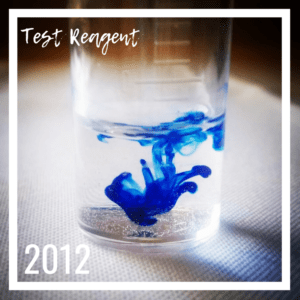
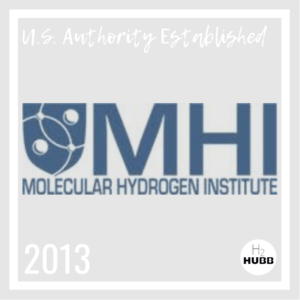
2013
U.S. authority established
Molecular Hydrogen Institute is a science-based nonprofit focused on advancing the research, education, and awareness of hydrogen as medical gas.
2014
fda approved
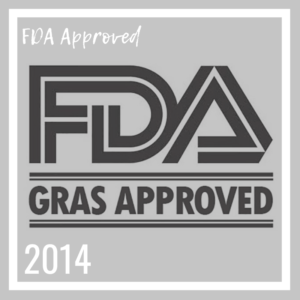

2016
H2 in hospitals
Hydrogen inhalation is approved as an advanced medical treatment for Post-Cardiac Arrest Syndrome (PCAS) by the Japanese Ministry of Health, Labour and Welfare to perform a 3 year long 360 patient human clinical trial involving 15 hospitals and/or institutions.
2016
official scientific standards
“International Hydrogen Standards Association (IHSA) is an international organization focused on determining the standards for measuring hydrogen gas, and establishing guidelines for its therapeutic use.”
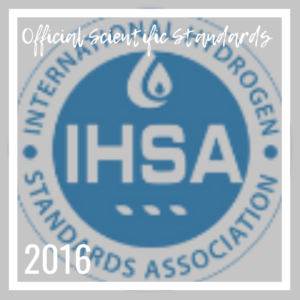
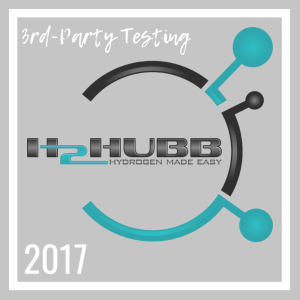
2017
Third-Party Recommendations
2019
Third-party Laboratory testing
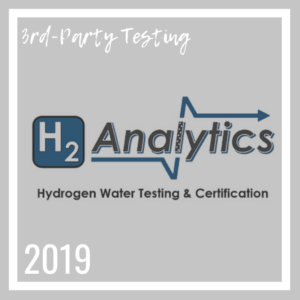

2024
growing industry
The biomedical research and therapeutic hydrogen industry is growing rapidly worldwide. Currently, there are more than 2000 scientific studies and publications on molecular hydrogen as a medical gas, with more than 170 human clinical studies and many more underway. Furthermore, the worldwide therapeutic hydrogen market is estimated to be more than 22 billion dollars and growing. At this rate, the US therapeutic hydrogen market is bound to seek an influx in the therapeutic molecule and its corresponding products.
- https://www.ncbi.nlm.nih.gov/pmc/articles/PMC3660246/
- https://www.ncbi.nlm.nih.gov/pmc/articles/PMC3660246/
- https://www.ncbi.nlm.nih.gov/pubmed/24793169
- https://www.ncbi.nlm.nih.gov/pmc/articles/PMC3660246/
- https://www.ncbi.nlm.nih.gov/pubmed/12796114
- https://books.google.com/books?id=tr1XAAAAYAAJ&printsec=frontcover&source=gbs_ge_summary_r&cad=0#v=onepage&q&f=false
- https://www.ncbi.nlm.nih.gov/pmc/articles/PMC3660246/
- https://en.wikipedia.org/wiki/Nicholas_Senn
- https://www.ncbi.nlm.nih.gov/pubmed/17856254
- https://en.wikipedia.org/wiki/Arne_Zetterstr%C3%B6m
- https://en.wikipedia.org/wiki/Arne_Zetterstr%C3%B6m
- https://en.wikipedia.org/wiki/Hydrox_(breathing_gas)#cite_note-fife-1
- https://www.researchgate.net/publication/21989955_Hyperbaric_hydrogen_therapy_A_possible_treatment_for_cancer
- http://www.nature.com/nm/journal/v13/n6/full/nm1577.html
- https://www.ncbi.nlm.nih.gov/pmc/articles/PMC3309943/
- http://www.molecularhydrogeninstitute.com/
- https://www.cfsanappsexternal.fda.gov/scripts/fdcc/?set=GRASNotices&id=520&sort=GRN_No&order=DESC&startrow=1&type=basic&search=520
- https://www.ncbi.nlm.nih.gov/pmc/articles/PMC5891106/
- http://www.intlhsa.org/
- https://h2hubb.com/about-us/
- https://www.h2-analytics.com/
- http://link.springer.com/chapter/10.1007/978-94-017-9691-0_8#page-1


